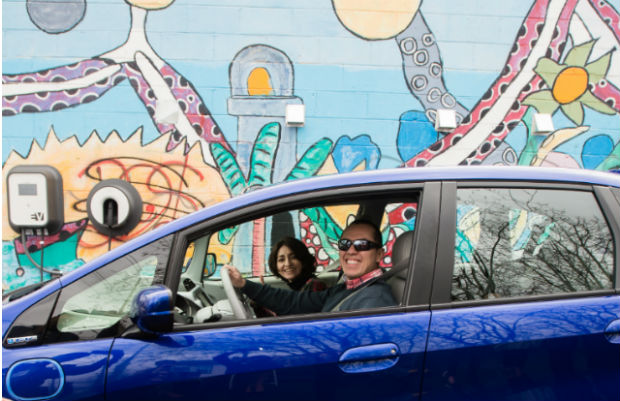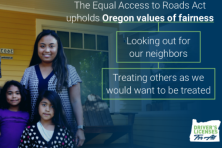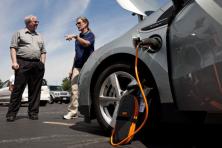
This is part of a series of articles on Electrifying Transportation.
Francy, husband Jair, and their kids live in Cully, a highly diverse, majority low-income neighborhood in Northeast Portland. This week they're cheering an electric vehicle (EV) car-share program that Drive Oregon is piloting in their neighborhood.
Francy and Jair were all smiles as they set out to test-drive one of the three EVs at the project kickoff last week. "Owning a car is expensive," said Francy. She likes to get around by bike, but that can be challenging in the rain and snow.
Speaking in her native Spanish, Francy described what a great opportunity it is to have affordable electric cars in the neighborhood. Calling the project “a grand vision for Portland and the world,” she said that electic cars are "more economical, and good for the planet.”
The Community Electric Vehicle Demonstration Project makes electric cars available to Hacienda CDC staff and community members in Cully through the end of this year. Three electric Honda Fits will be located at Vista de Rosas, an affordable housing apartment complex owned by Hacienda CDC. They will be available at $10 per day, including one with a car seat. Three charging stations were installed to support the project, and will remain after the pilot is complete. The project was developed by Drive Oregon in partnership with Hacienda CDC and Pacific Power, with support from Meyer Memorial Trust and the 11th Hour Project.

Many underserved communities in Portland have limited access to affordable transportation options. Transportation is most families’ second highest monthly expense. Hacienda CDC’s Gena Scott said at the project kick off, “While public transportation is a great solution, many of our community members don’t have access to bus routes where they live, or face hours of time or multiple transfers simply to get to work.”
This project aims to address several of the barriers to low income families’ use of electric cars, including the cost of purchase, the limited availability of charging stations for renters and people outside the central city, and the lack of familiarity and experience with how EVs work.
Multnomah County Commissioner Jessica Vega Pederson spoke at the kickoff about the importance of affordable transportation to affordable housing, saying that “electric vehicles are a key piece of this solution.” As a state legislator, Vega Pederson championed the Clean Energy and Coal Transition Plan and protection of the Clean Fuels Program, which reduce carbon emissions and grow our clean energy economy. The EV pilot project, she said, does both those things, “but most importantly, it ensures that underserved and communities of color benefit from these new investments and new technologies.”
Transportation makes up over a third of Oregon’s carbon emissions and is a major source of air pollution in our communities. Powering cars without fossil fuels is an essential climate strategy, which is why EVs are an important part of Oregon's Clean Fuels Program. With the passage of the Clean Electricity and Coal Transition Plan last year, Oregon’s electricity grid is on the path to being powered primarily by clean energy, which means that the clean electric cars will also be fueled by clean power.
Projects like this pilot can help increase clean transportation options in communities with lower incomes and high pollution corridors, and can provide valuable information about what strategies are needed to make electric car sharing work. Drive Oregon also hopes to show people that electric cars are more affordable than people realize. Jeff Allen, Drive Oregon’s Executive Director, said, “You can buy a two or three year old electric vehicle for $7,000-8,000.” Owners of EVs can also save money because it costs much less to power a car with electricity than gasoline (under $3.50 vs. $12+ to drive 100 miles), and EVs require much less maintenance.
To meet Portland’s climate goals, 10-15% of all noncommercial vehicle miles traveled on city roads will need to be driven in electric vehicles by 2030. As the City of Portland’s EV strategy makes clear, expanding access to underserved communities garners multiple benefits, including “improving economic opportunity, wealth building and upward mobility.” Residents of the Cully neighborhood are testing solutions and helping their community breathe a little easier with cleaner vehicles.



